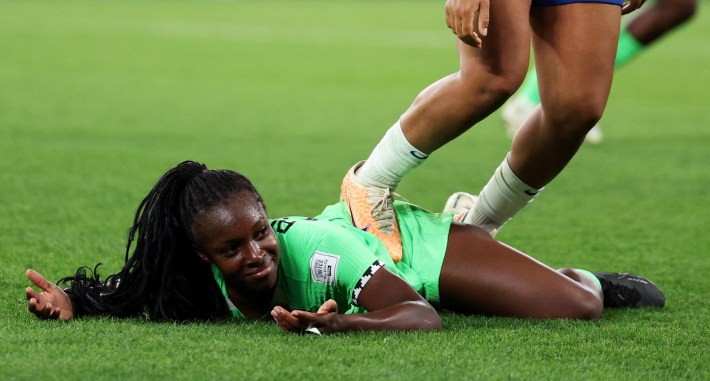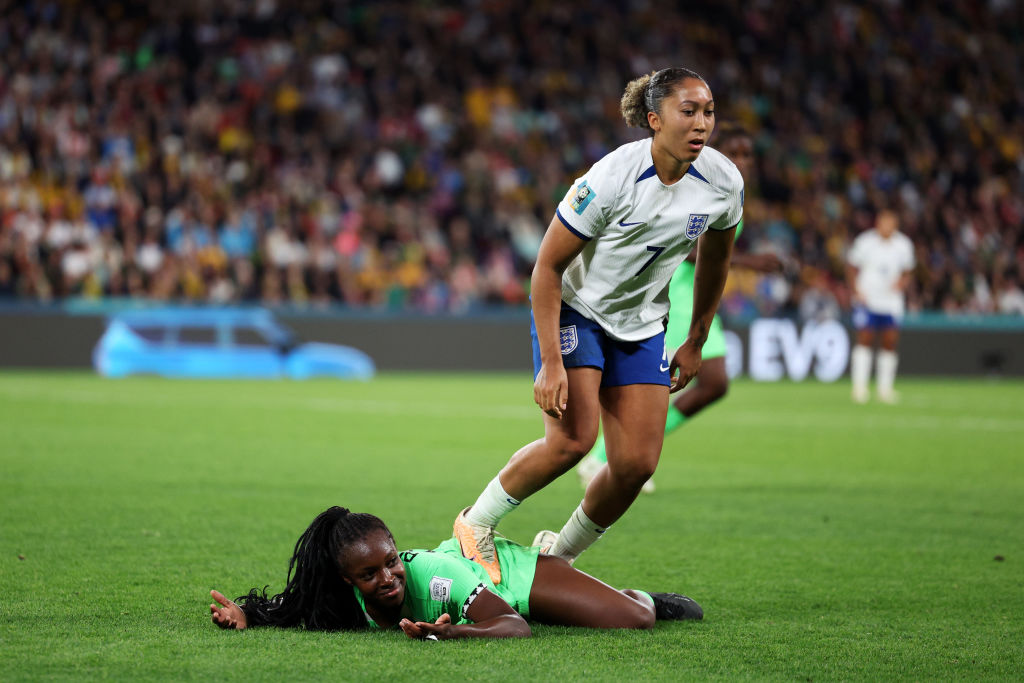Germany, Brazil, and Canada all crashed out of this World Cup at the group stage, and in their place stand teams like Morocco, Jamaica, and Nigeria. On a pitch featuring the reigning champions of Europe, the best player on the field was a Haitian. An unimpressive Sweden finished the job the World Cup debutants of Portugal started by knocking out the USWNT. The 2-0 scoreline might not imply it, but South Africa put the fear of God in the Netherlands over the weekend, even though the Dutch came away with a win. At this point in the tournament, there's no questioning how serious the ostensible underdogs are, and how seriously scared the favorites should be going into every match. Monday's England-Nigeria knockout match, in which the Super Falcons thoroughly outplayed the far more esteemed Lionesses for 120 minutes, was just another example of this tournament-defining phenomenon, even if the English ultimately survived and advanced.
Matches where a comparatively smaller team plays better than a bigger team tend to look a certain way. Often, the underdog focuses its efforts battening the hatches, admirably withstands the big dog's attacking torrents thanks to some heroic defending and/or goalkeeping, and hits out on counter attacks of just enough frequency and threat to prevent the match from ever feeling entirely one-sided. Nigeria's performance against England was decidedly not one of those kinds of games. By any justifiable use of the word, Nigeria dominated England—in every area of the pitch, and from the opening kickoff up through to the whistle that called time on open play.
England received a huge boost to its chances in the match and in the tournament overall when Keira Walsh, who appeared to suffer a significant knee injury in the second match of the group stage, appeared in the starting lineup. Surely with their midfield maestro back on the pitch, partnered with the little genius who'd lifted the team to new heights in Walsh's absence, the Lionesses were poised to throttle Nigeria. But the Super Falcons had no intention on playing the tomato can.
The Nigerians' success against England in the match was in large part a strategic matter: their midfield trio of Toni Payne, Christy Ucheibe, and Halimatu Ayinde tirelessly hounded their English counterparts Lauren James, Walsh, and Georgia Stanway all day long. Nigeria didn't allow those three even an iota of time or space, with or without the ball. That constant surveillance meant England's central braintrust could hardly receive the ball at all, and when those three did get a touch they almost never found themselves with time to think, space to maneuver, and a clear view of the lay of the land. This blockade in the middle of the park totally short-circuited England's vaunted attack. The Lionesses were able to keep hold of the ball for long stretches—they had 56 percent of the possession for the game, a figure that was even higher during the 87 minutes when the match was played 11 vs. 11—but they were wholly incapable of orchestrating the flowing, incisive passing sequences that mark their game at its best.
England simply could not move the ball and the team forward at the same time. If they tried to pull off one of their customary passing moves to progress the team up the pitch in a coordinated matter, Nigeria's midfield sentinels would wall off the middle of the pitch, forcing Walsh and James and Stanway deeper and deeper toward their own back line in search of space that never appeared. When England attempted to bypass the midfield by playing long balls up and out to the forwards and wingers, Nigeria's forwards pressured England's defenders into rushed, inaccurate passes that the Nigerian defenders constantly either cleared or intercepted. And when Nigeria forced England into a turnover, they were quick to stroke long passes out to the wing, where their attackers could sharpen their knives and get to cutting their way towards England's goal. It was a masterclass in tactical preparation, implementation, and winning duels all over the pitch. Nigeria took 20 shots to England's 12, which accurately communicates how much more in control the supposedly inferior team was.
England never solved the problems Nigeria caused them, and instead just kept trying what wasn't working. In fact just about the only time England really reacted to what Nigeria was doing to them was when Lauren James, frustrated at being essentially marked out of the game for almost 90 minutes, petulantly stepped on the butt of Nigeria defender Michelle Alozie, earning herself a red card in the 87th minute. The Beckham-esque fit of pointless pique left England down a player as the match headed into extra time, giving Nigeria 30 minutes to finally apply the killing blow they'd been working toward all match long. If the stats and rhythm of the game didn't already tell the story of Nigeria's dominance, then maybe it's located in the amused look that came over Alozie's face as she was being stomped on.

That's the look of someone who knows, with absolute certainty, that she's gotten the best of her opponent.
Sadly for Nigeria, and to England's great fortune, their killing blow never landed. Nigeria remained the stronger team in extra time, but all that energy expended during regulation meant Nigeria didn't have too much to give in the final periods of play. Ultimately, the one major flaw Nigeria carried throughout the tournament—a lack of ruthlessness in front of goal, which meant the Super Falcons only scored in one of their four matches Down Under—reared its head again, and the open-play portion of the match ended in a scoreless draw.
England entered the resulting penalty shootout no doubt lifted by its reprieve from the fate they probably deserved, while Nigeria had to have been agonizing over potentially letting their golden chance to be the first African nation to win a knockout match slip from between their fingers. Outside of a poor first kick, England's penalties were confident and accurate, while Nigeria's were almost uniformly nervous. Two opening misses from Nigeria gave Chloe Kelly the chance to seal a come-from-beneath victory with England's fifth attempt. With a deep breath, a big hop, and a wicked swing of her leg, Kelly delivered, keeping England alive in the tournament they are favorites to win.
KELLY WINS IT FOR ENGLAND 💪
— FOX Soccer (@FOXSoccer) August 7, 2023
🏴: ❌✅✅✅✅
🇳🇬: ❌❌✅✅ pic.twitter.com/5hJnXW7XX4
At the top end of the sport, amongst teams contending for the major titles, the narrative trajectory of women's soccer at the international level for the better part of a decade now has gone a little something like this: After a long stretch of American dominance, born mostly of the collegiate system's sizable investment in the game, women's soccer was evolving away from the primarily physical game that typified the American approach, and toward a more tactically sophisticated, technically proficient style. This new era was to be inaugurated by the big European nations as they slowly started to commit more resources to girls' and women's soccer. Coming into the 2023 World Cup, the tournament was primed to serve as something of a referendum on the state of this evolution, depending on how the USWNT performed in relation to ascendant Europeans like England, the Netherlands, Germany, France, and Spain.
But something far more interesting has happened instead. Yes, you could argue that that narrative of evolution at the top has indeed borne out after the U.S.'s disappointing tournament and early ouster, but the much more evident evolution is one that has occurred below.
Morocco, Jamaica, Nigeria, South Africa, Haiti, Portugal, and all the other underdogs who've brought this tournament the surprises and upsets that have thus far defined it have shown that the most rapidly shrinking gap in women's soccer is the one that previously separated the "big" countries from the "small" ones. Today, the physical disparities that used to allow the big teams to almost literally run over and past smaller opponents have been almost entirely erased. Coupled with that athletic equality—which is by itself enormous, as physical prowess continues to make the biggest differences in the women's game—is an increased strategic sophistication in preparation and implementation from teams around the world. This has made it so that a team like Portugal can both match the U.S.'s physicality and also execute a game plan that neutralizes the USWNT's strengths and maximizes Portugal's chances of coming away victorious. Or, in the instance at hand, it means Nigeria can face England and physically, tactically, and technically dominate them from beginning to end.
It's too bad Nigeria wasn't able to finish the job and knock off England in what would've instantly become the defining result of a tournament chock full of shocks, excitement, and brilliance. But if Nigeria's and South Africa's and Jamaica's and Haiti's and Portugal's all the other small teams' performances this summer stand for anything, it's the idea that this is only the beginning.






